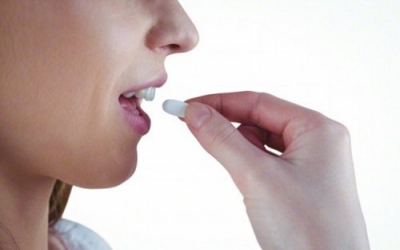- Latest news▼
-
15:11, April 24 Zombie deer disease possibly linked to hunters’ deaths

-
12:27, April 23 Appetite: Scientists found out the secret to the appeal of large portions of fast food

-
10:33, April 23 Scientists test new approach to fighting viruses

-
08:38, April 23 Ketamine may help with postpartum depression

-
22:12, April 22 Unhealthy amount of sugar found in baby food products of a well-known brand

-
19:41, April 22 Air pollution puts health of more than 1.6 billion workers globally at risk

-
17:25, April 22 Scientists found baked goods and lack of sleep to be more dangerous than alcohol

-
16:02, April 22 342 cases of measles recorded in Armenia so far in 2024

-
15:29, April 22 BrainStimulation: electrical brain stimulation alleviates anxiety and depression in the elderly

-
08:27, April 22 Cognitively stimulating jobs in midlife could lower dementia risk in old age, study finds

-
20:37, April 21 Environmental Health Perspectives: Microplastics ingested with food and water can spread from the gut to the brain

-
22:41, April 20 Scientists develop new method to safely stimulate immune cells to fight cancer

-
20:46, April 20 Blood test can determine who is at risk of developing multiple sclerosis - scientists

-
18:36, April 20 Next pandemic likely to be triggered by flu - scientists

-
12:16, April 19 Scientists grow human mini-lungs in lab

All materials
Could taking antibiotics increase your risk of STDs?

Taking antibiotics could increase a person's chance of being diagnosed with a sexually transmitted disease, a new study warns. The drugs disrupt the microbiome of the vagina, resulting in a loss of bacterial diversity, scientists discovered.
This, in turn, increases a compound that blocks the immune system's T-cells from migrating to the vaginal tissues to fight any infections.
Researchers in Korea and Japan found mice treated with antibiotics succumbed to HSV-2, a type of genital herpes infection, faster than a control group not given the drugs. The mice were treated with antibiotics for four weeks before they were exposed to the HSV-2 virus.
Microbiota are known to play a vital role in antiviral immunity, providing signals to the immune system. However, the impact of an imbalance of bacteria in the microbiota, known as dysbiosis, remains unclear.
As a result, a team of scientists led by Ji Eun Oh from the Korea Advanced Institute of Science and Technology examined the role dysbiosis plays.
The authors of the study, published in the Proceedings of the National Academy of Sciences, found the imbalance is caused by oral antibiotic treatment.
Furthermore, they note it 'directly impairs antiviral immunity following viral infection of the vaginal mucosa'.
They discovered mice treated with antibiotics were more susceptible to becoming infected with a type of genital herpes virus, in comparison with mice given a placebo of water.
In addition, their findings revealed those antibiotic-treated mice infected with the herpes virus showed a 'delayed viral clearance at the site of infection', meaning the virus took longer to be treated.
All the mice treated with antibiotics prior to being exposed to the herpes virus died within 11 days of infection. The authors noted: 'Taking these data together, we find that depletion of commensal bacteria results in a severe defect in antiviral protection following mucosal HSV-2 infection.'
The scientists found that the imbalance in bacterial diversity in the vaginal microbiota in mice treated with the drugs, triggered an increase in an alarmin called IL-33.
This blocked the immune system's T-cells from migrating to the vaginal tissues, and also stopped them secreting antiviral cytokines, which are crticial in the fight against viruses.
The authors wrote: 'Our present study demonstrates that inhibitory signals induced by the depletion of commensal microbiota also affect antiviral immunity.
'Taken together, our findings provide a unique insight into the role of commensal bacteria in maintaining the integrity of surface barrier epithelial cells by preventing pathogenic bacteria colonization, thereby supporting a micro-environment conducive to antiviral defense.'
The scientists concluded that their results have implications for the use of oral antibiotics, and increased risk of STDs.
Follow NEWS.am Medicine on Facebook and Twitter
- Video
- Event calendar
- Archive
- Most read
month
week
day
- JAMA Oncology: Urine test can help rule out high-grade prostate cancer with almost 100% accuracy, study shows 1253
- Daily Mail: Elderly woman in China gets infected with brain-eating amoeba 1194
- Obesity: exercising before breakfast helps you lose weight faster 1176
- Scientists grow human mini-lungs in lab 1143
- Next pandemic likely to be triggered by flu - scientists 881
- Scientists found baked goods and lack of sleep to be more dangerous than alcohol 791
- 342 cases of measles recorded in Armenia so far in 2024 750
- Blood test can determine who is at risk of developing multiple sclerosis - scientists 732
- Scientists develop new method to safely stimulate immune cells to fight cancer 730
- Cognitively stimulating jobs in midlife could lower dementia risk in old age, study finds 714
- BrainStimulation: electrical brain stimulation alleviates anxiety and depression in the elderly 660
- Air pollution puts health of more than 1.6 billion workers globally at risk 529
- Unhealthy amount of sugar found in baby food products of a well-known brand 524
- Ketamine may help with postpartum depression 512
- Appetite: Scientists found out the secret to the appeal of large portions of fast food 508
- Find us on Facebook
- Poll





